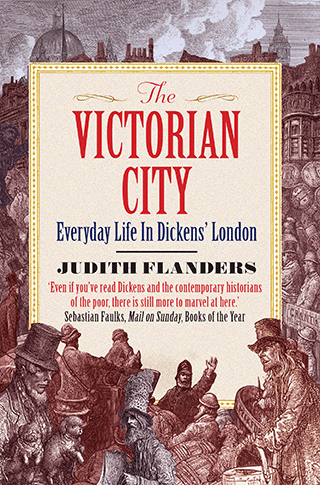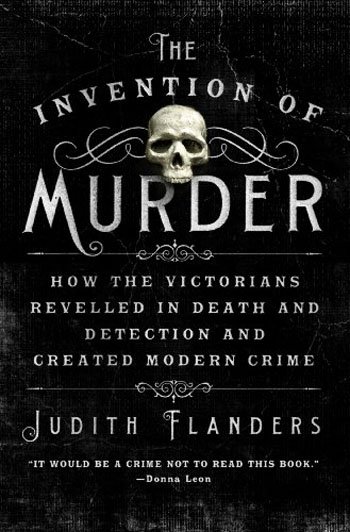The Victorian City: Everyday Life in Dickens’ London
 Victorian buildings still surround Londoners, so we are under the impression we know the Victorian city and how it functioned. But just as Flanders’ The Victorian House revealed the long-lost daily routines of the Victorian home, so now she describes the comings and goings of the world’s largest city. Calling on the magical eye of Charles Dickens, possibly the greatest ‘look-er’ the city has ever seen, Flanders takes her readers down the teeming city streets of the 19th century, conjuring up the once-common street-bands, street-sellers, street-walkers and street-children. How did passengers hail an omnibus? How were the streets paved before macadam? How did householders collect their drinking water? With these and other questions, Flanders brings back to life a city of pea-soup fogs, horse manure, and even gutters running with blood.
Victorian buildings still surround Londoners, so we are under the impression we know the Victorian city and how it functioned. But just as Flanders’ The Victorian House revealed the long-lost daily routines of the Victorian home, so now she describes the comings and goings of the world’s largest city. Calling on the magical eye of Charles Dickens, possibly the greatest ‘look-er’ the city has ever seen, Flanders takes her readers down the teeming city streets of the 19th century, conjuring up the once-common street-bands, street-sellers, street-walkers and street-children. How did passengers hail an omnibus? How were the streets paved before macadam? How did householders collect their drinking water? With these and other questions, Flanders brings back to life a city of pea-soup fogs, horse manure, and even gutters running with blood.
Praise for “ The Victorian City ”
Interview on C-Span’s Book TV
[youtube_sc url=eLAtNiOc7mc]
The Invention of Murder
 Murder in the nineteenth century was rare. But murder as sensation and entertainment became ubiquitous, with cold-blooded killings transformed into novels, broadsides, ballads, opera, and melodrama—even into puppet shows and performing dog-acts. Detective fiction and the new police force developed in parallel, each imitating the other—the founders of Scotland Yard gave rise to Dickens’s Inspector Bucket, the first fictional police detective, who in turn influenced Sherlock Holmes and, ultimately, even P.D. James and Patricia Cornwell.
Murder in the nineteenth century was rare. But murder as sensation and entertainment became ubiquitous, with cold-blooded killings transformed into novels, broadsides, ballads, opera, and melodrama—even into puppet shows and performing dog-acts. Detective fiction and the new police force developed in parallel, each imitating the other—the founders of Scotland Yard gave rise to Dickens’s Inspector Bucket, the first fictional police detective, who in turn influenced Sherlock Holmes and, ultimately, even P.D. James and Patricia Cornwell.
In this meticulously researched and engrossing book, Judith Flanders retells the gruesome stories of many different types of murder, both famous and obscure: from Greenacre, who transported his dismembered fiancée around town by omnibus, to Burke and Hare’s bodysnatching business in Edinburgh; from the crimes (and myths) of Sweeney Todd and Jack the Ripper, to the tragedy of the murdered Marr family in London’s East End. Through these stories of murder—from the brutal to the pathetic—Flanders builds a rich and multi-faceted portrait of Victorian society. With an irresistible cast of swindlers, forgers, and poisoners, the mad, the bad and the utterly dangerous, The Invention of Murder is both a mesmerizing tale of crime and punishment, and history at its most readable.
Buy this Book:
Praise for “The Invention of Murder”
‘This is much more than a compendium of famous crimes. As such books as The Victorian House and Consuming Passions have demonstrated, Flanders’s knowledge of the period is both wide and extraordinarily deep. She writes incisively and often with dark wit. Best of all, she has a wonderful ability to make connections and to show us familiar sights from unexpected angles. All of these qualities are displayed to the full in The Invention of Murder.’
Independent (full review)
‘Judith Flanders displays a profound understanding of the Victorian age, encyclopaedic knowledge of crime and criminals, and the popular reactions towards both. Further, she presents it with a sly, wry humour that is a perfect complement to the subject. Dare I say it would be a crime not to read this book?’
Donna Leon
‘an entertaining excursion into the Victorians’ taste for murder…The cast is full of swindlers and forgers and other doubtful characters’
The Telegraph
‘Flanders has written a book rather like one of the great, rambling Victorian novels that she discusses, though most readers will find her work a lot easier, and a lot more fun […] the sheer sumptuousness of Flanders’s book leaves the reader wanting still more’
Clive Emsley, BBC History Magazine (full review)
‘Flanders’s book is more than a catalogue of crimes … it builds into an alternative history of the Victorian age, its narrow, purposeful focus providing a means of seeing, from an oblique perspective, terrain which might previously have seemed familiar.’
Jonathan Barnes, Times Literary Supplement (full review)
‘Judith Flanders has produced a compelling study of how crime, and crime prevention, emerged as a popular obsession in 19th-century Britain, and came to dominate its literature …The Invention of Murder is mesmerizing.’
Charlotte Gray, Globe and Mail (full review)
‘…part social history, part literary history, and part penny-blood itself. In the fine tradition of its subject it both has its cake and eats it. Yum. Strychnine’
Sam Leith, Spectator (full review)
‘Flanders brings to her writing a vivid storyteller’s and nicely understated gallows humour […] More important though, and far more impressive, is her tenacity in stripping away the gaudy layers of folktale and legend around the period’s most notorious murders and revealing how often these inventions obscured lives of heartbreaking ordinariness.’
Robert Douglas-Fairhurst, Telegraph (full review)